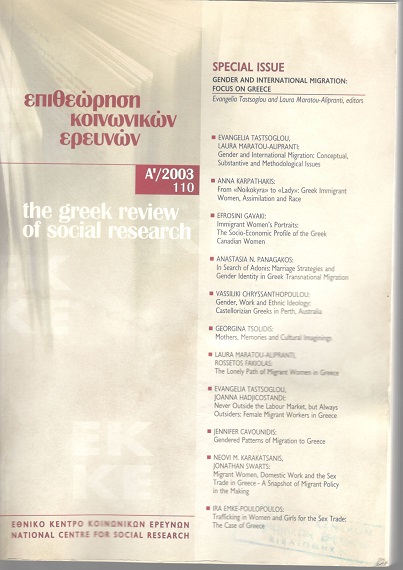Mothers, memories and cultural imaginings
Abstract
Δhis paper is an exploration of the role of the maternal in the creation of diasporic Greekness. It is argued that women’s labour is pivotal in the transferral and reconfiguration of culural identity, particularly as it is lived between generations and between nations. The paper is based on a study conducted with the daughters of Greek post-war immigrants to Australia and Canada. Women born in these countries and now living in Greece are also included in an effort to understand diaspora as transnational and constituted through two-way flows between countries of origin and destination. Interviews were conducted as a means of exploring how these women constituted «Greek». They were asked to explore their mothers’ role in the constitution of their Greekness and how, in turn, their own mothering constituted Greekness for their children. A central problematic is the possibility of understanding diasporic maternity as potentially transformative. This is explored in relation to Greekness in Australia and Canada and its association with tradition. It is also explored in relation to «Englishness» in Greece and its progressive associations. The argument is made that the «new ethnicities» which are emblematic of the «new times» (Hall, 1996) are a product of women’s labour in the private sphere. It is here that children are reared in ways which maintain difference which is a signpost for the cultural fluidity so necessary for successful citizenship in the era of globalization..
Article Details
- How to Cite
-
Tsolidis, G. (2003). Mothers, memories and cultural imaginings. The Greek Review of Social Research, 110, 141–163. https://doi.org/10.12681/grsr.9169
- Section
- Articles

This work is licensed under a Creative Commons Attribution-NonCommercial 4.0 International License.
Authors who publish with this journal agree to the following terms:
- Authors retain copyright and grant the journal right of first publication with the work simultaneously licensed under a Creative Commons Attribution Non-Commercial License that allows others to share the work with an acknowledgement of the work's authorship and initial publication in this journal.
- Authors are able to enter into separate, additional contractual arrangements for the non-exclusive distribution of the journal's published version of the work (e.g. post it to an institutional repository or publish it in a book), with an acknowledgement of its initial publication in this journal.
- Authors are permitted and encouraged to post their work online (preferably in institutional repositories or on their website) prior to and during the submission process, as it can lead to productive exchanges, as well as earlier and greater citation of published work (See The Effect of Open Access).



